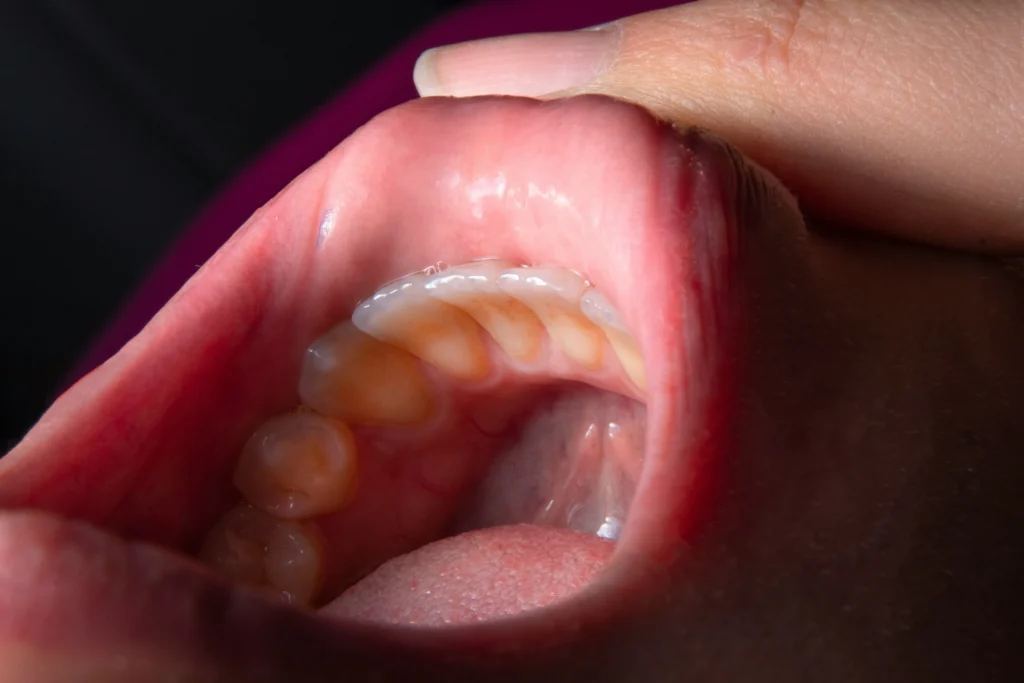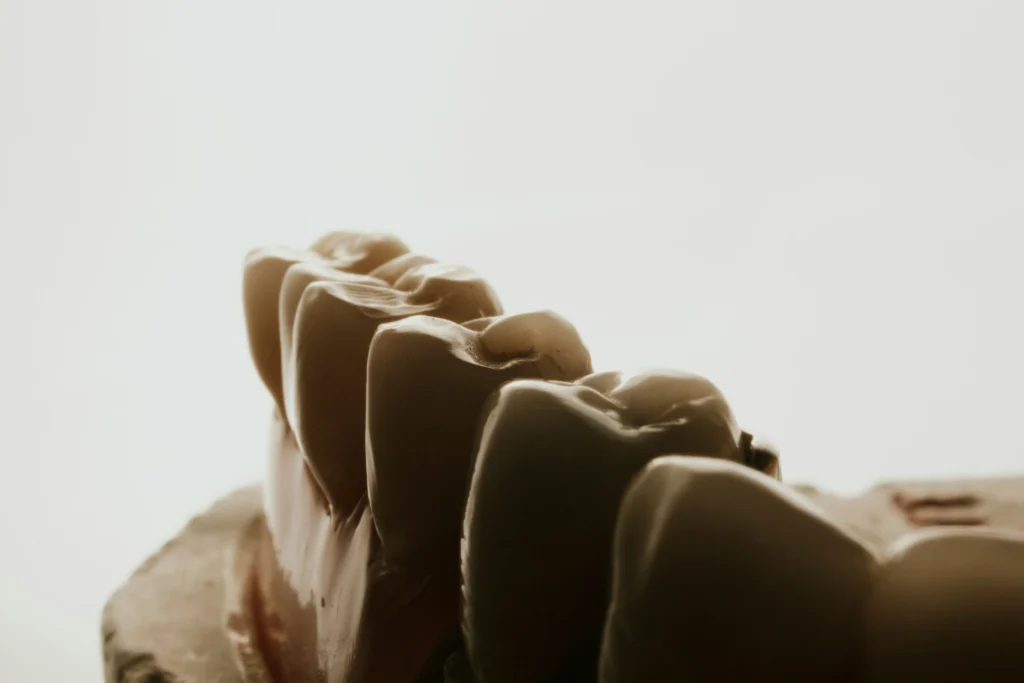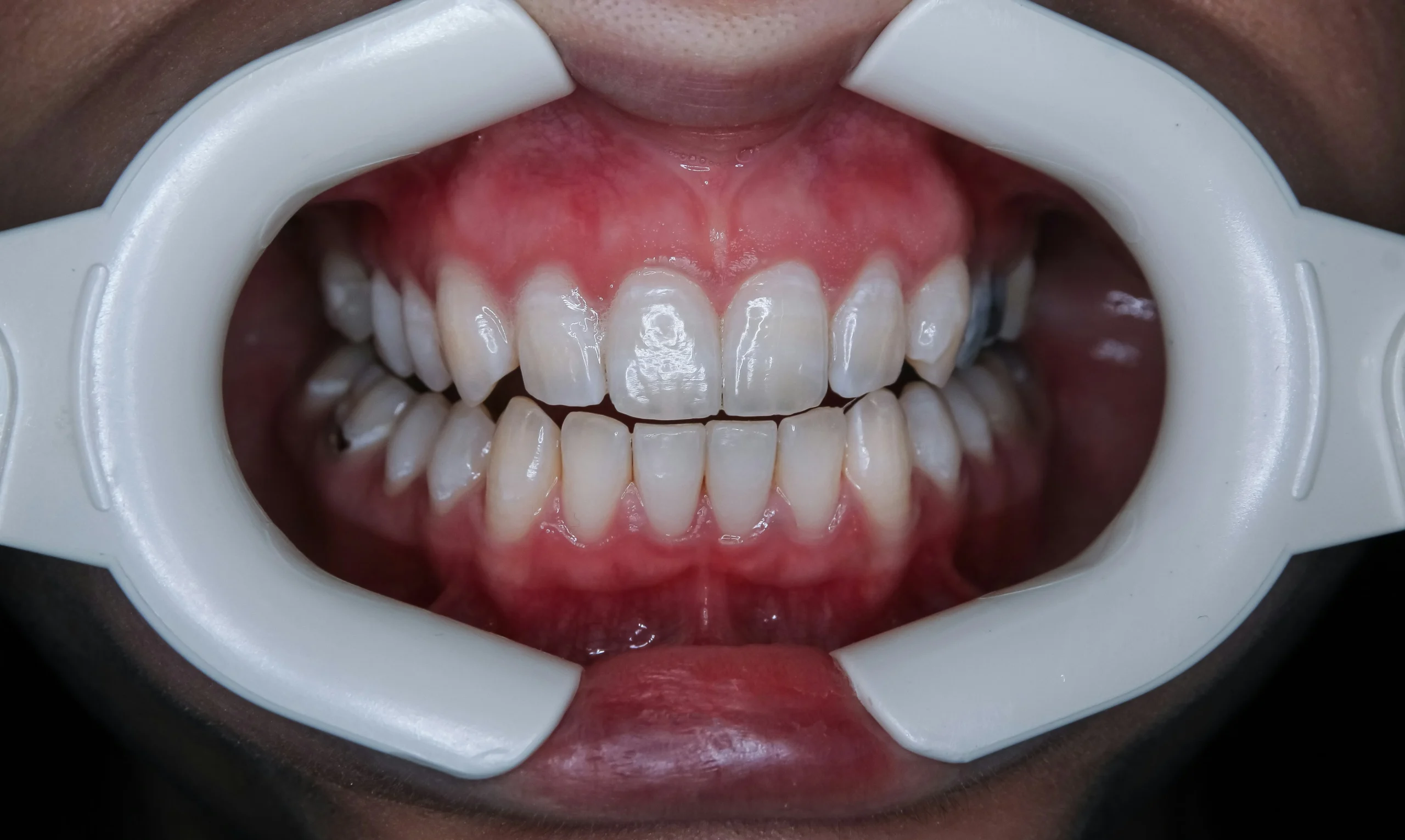If you’re hearing clacking at night or noticing chipped teeth in the morning, you’re not alone. Dementia and teeth grinding often travel together, and the impact on comfort, nutrition, and dental work can be significant. As a team that provides mobile, in-home dentistry across all of New Jersey, we help families every day manage teeth grinding in their loved ones with dementia with calm, practical steps—right where your loved one lives.
At Dental Home Services, our geriatric-focused dentists bring state-of-the-art portable equipment to homes and assisted living communities. If teeth grinding is wearing down enamel, loosening restorations, or causing jaw pain, we can evaluate, protect, and treat—all without the stress of an office visit.
👉 Have questions now? Call 1-800-842-4663 or contact us to schedule a house call.
Dementia and Teeth Grinding: What It Is and Why It Matters

Clinically known as bruxism, teeth grinding and dementia commonly intersect. Grinding may occur while awake or during sleep and is driven by involuntary muscle activity in the jaw. The result can be cracked teeth, failing fillings, headaches on waking, and tenderness in the jaw joint. In people living with dementia, bruxism can be intensified by sleep disruptions, medications, anxiety, and difficulty communicating discomfort.
A trusted medical review on bruxism explains that sleep-related grinding is linked to micro-arousals of the nervous system and can occur alongside obstructive sleep apnea, certain neurologic conditions, and medication effects. For caregivers, that means teeth grinding dementia is not “just a habit”—it’s a medical and dental issue worth proper assessment and management (Bruxism Management – NCBI Bookshelf).
Dementia and Teeth: How Grinding Damages the Mouth
Left unmanaged, dementia and teeth grinding can lead to:
- Microfractures and chips that make teeth sensitive
- Flattened biting surfaces and shortened teeth
- Cracked crowns, loosened dentures, and broken partials
- Sore jaw muscles, limited opening, and temple headaches
- Mouth sores under dentures from nighttime clenching
Because comfort and nutrition are closely tied to oral function, unchecked teeth grinding in patients with dementia can quickly escalate into difficulties eating, weight loss, and a reduced willingness to wear dentures. Our mobile team can step in to adjust dentures, repair damage, and reduce painful friction in one convenient visit. Explore our full services and dentures pages for more information.
Teeth Grinding Dementia Patients: What Caregivers Notice First
Caregivers often report:
- New clicking sounds during sleep or quiet times
- Morning jaw fatigue, rubbing the temples, or “face pain”
- Bite marks on the inner cheeks or tongue
- Worn or thinning denture teeth and “looser” dentures
- Restlessness at night and daytime sleepiness
If you’re seeing these signs, a dental home visit can provide an exam, gentle cleaning, and an action plan tailored to dementia patient – and their grinding needs—without the stress of visiting a traditional dental office.
Why Do Dementia Patients Grind Their Teeth?

Families frequently ask, why do dementia patients grind their teeth and why do people with dementia grind their teeth more at night?
- Sleep arousal physiology: Micro-arousals during sleep can trigger rhythmic jaw contractions.
- Obstructive sleep apnea (OSA): Up to half of adults with OSA have co-morbid sleep bruxism; treating OSA can reduce episodes.
- Medications: Certain antidepressants and stimulants can be associated with bruxism.
- Neurologic conditions: Alzheimer’s disease and other neurodegenerative disorders may heighten risk.
- Stressors and substances: Caffeine, alcohol, tobacco, and life stress can worsen grinding.
Because causes are multifactorial, the best strategy blends dental protection, sleep and medication review, and simple daily routines that reduce triggers. Our clinicians coordinate with physicians and caregivers to support the full picture of teeth grinding dementia patients.
Dementia and Teeth Grinding: Safe, Dentist-Led Options at Home
Here’s how we typically approach dementia and teeth grinding during an in-home visit:
- Gentle Examination & Screening
We check for tooth wear, cracked restorations, sore muscles, denture pressure points, and signs of sleep disruption. If apnea is suspected, we’ll recommend speaking with a medical provider; treating OSA can reduce grinding frequency. - Protective Oral Devices (When Appropriate)
Custom hard-acrylic guards can protect teeth and dental work and ease morning jaw soreness. For denture wearers, we evaluate fit and provide denture adjustments or repairs to minimize rubbing under clenching.
• Note: In patients with obstructive sleep apnea, traditional occlusal splints may worsen apnea. A physician-directed mandibular advancement device may be preferable. Our dentists collaborate with your medical team to keep care safe. - Medication & Substance Review
If grinding coincides with new prescriptions, we can coordinate with physicians about potential alternatives. We also encourage reducing evening caffeine, alcohol, and tobacco. - Comfort-First Behavior Strategies
Consistent bedtime routines, low-light environments, soft jaw relaxation exercises, and brief reassurance can reduce arousal-related clenching. Small, simple changes add up—especially for teeth grinding in dementia patients who benefit from predictable cues. - Denture-Specific Support
For partials or full dentures, we confirm nighttime removal when appropriate, optimize fit, and guide caregivers on secure yet gentle adhesive use. See our related posts on adhesive paste and home care tips on our blog.
Teeth Grinding and Dementia: Special Considerations for Dentures

Because grinding amplifies friction, dentures that once felt fine can quickly become sore or unstable. Our team can:
- Reline or adjust dentures to reduce hotspots caused by clenching
- Repair fractured denture teeth or flanges on the spot when possible
- Replace excessively worn denture teeth for better chewing and speech
- Review safe overnight routines to rest tissues and maintain hygiene
If clenching is persistent, we’ll also check that daily brushing and rinsing are comfortable and achievable. When dexterity or memory make hygiene tough, our caregivers’ coaching during visits helps families keep routines simple and consistent.
Explore your options for complete dentures and removable dentures, and see why families trust our approach in their reviews.
Dementia and Teeth Grinding: How We Coordinate Care Across New Jersey

We routinely coordinate with primary care, neurology, sleep medicine, and facility nursing to ensure comfort and safety. Our clinicians practice geriatric dentistry with added patience and flexibility—modifying plans to match attention span, mobility, and tolerance.
Learn more about our philosophy and training in geriatric dentistry and how we tailor care across the spectrum of dementia in our article on dementia versus Alzheimer’s.
We serve all of New Jersey and nearby New York counties with true house calls. See our list of locations, or explore how our we work as mobile dentists for elderly patients with dementia or Alzheimer’s.
Dementia and Teeth Grinding: Caregiver-Friendly Daily Routine
A simple, repeatable routine helps calm the jaw and protect dental work:
- Evening wind-down: dim lights, reduce screens, soft music
- Gentle jaw relaxation: light massage to masseter/temple areas
- Medication check: note any new meds that correlate with grinding
- Denture check: ensure fit; remove overnight if advised; clean thoroughly
- Morning scan: look for cheek/tongue biting and new wear marks
When routines aren’t enough—or when pain, breakage, or refusal to wear dentures appears—book a visit. Our news page on dentist home visits explains exactly what to expect when we come to you.
Dementia and Teeth Grinding: Related Reading for Families
- Daily hygiene and prevention: Dementia and dental care
- Oral hygiene’s cognitive link: Link between brushing teeth and dementia
- What we do and where we go: Dental Home Services
Ready for Calm Nights and Comfortable Days?

If dementia and teeth grinding are wearing down your loved one’s smile—or your peace of mind—professional, in-home support makes all the difference. We bring gentle care, clear communication, and practical solutions directly to you, anywhere in New Jersey.
👉 Let’s make a plan that works at home. Call +1-800-842-4663 or schedule an appointment today.
Frequently Asked Questions About Dementia and Teeth Grinding
What causes dementia and teeth grinding at night?
Sleep micro-arousals, possible obstructive sleep apnea, and certain medications can trigger night-time bruxism. A personalized plan may include dental protection, a sleep evaluation, and simple evening routine adjustments.
Is dementia patient grinding teeth dangerous for dental work?
Yes. Grinding can chip teeth, crack crowns, and damage dentures. We provide on-site repairs and fit adjustments to protect the mouth and restore comfort.
Can teeth grinding in dementia patients be stopped completely?
Often it can be reduced and its effects controlled. Custom guards (when appropriate), denture optimization, and trigger management help limit damage and morning jaw pain.
What if my loved one refuses a mouthguard?
We have non-device options: denture adjustments, soft tissue protection strategies, and behavioral routines. Our mobile team adapts to tolerance and preferences.
How do I get help in New Jersey?
We serve the entire state. Call 1-800-842-4663 or request a visit. You can also learn more about our approach on our services page.
Disclaimer: This article is for informational purposes only and does not replace personalized dental or medical advice. Always consult qualified providers regarding diagnosis and treatment.

